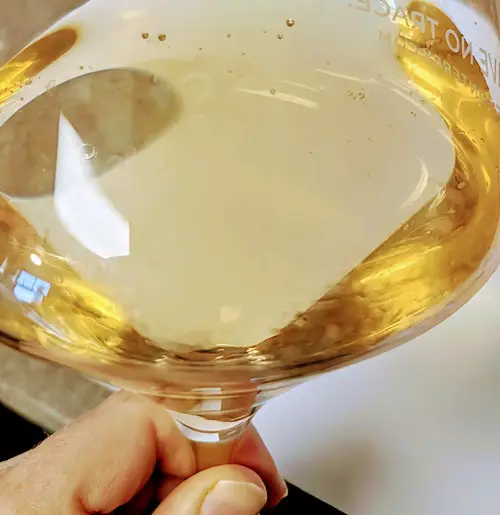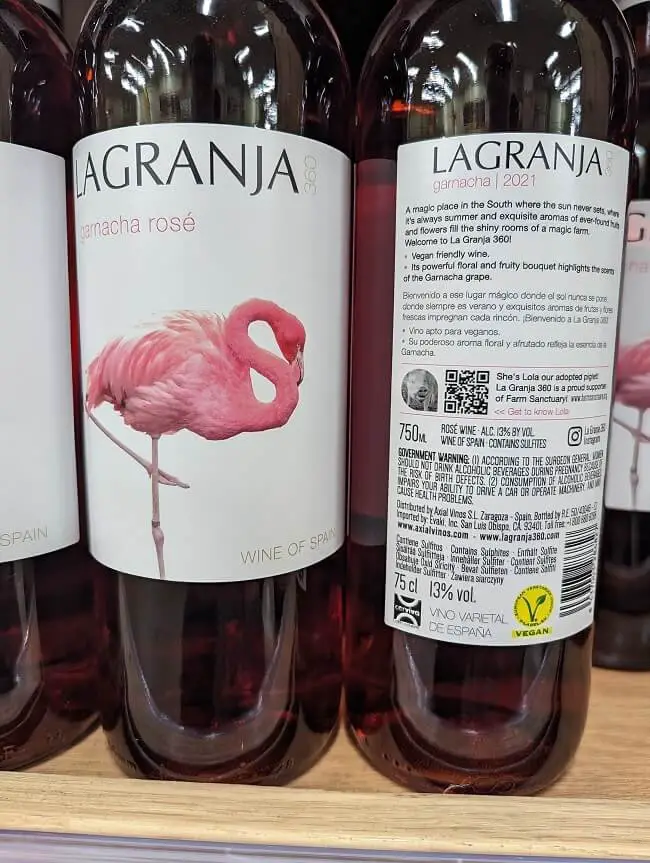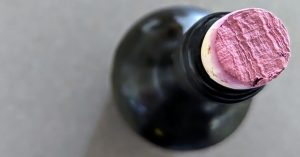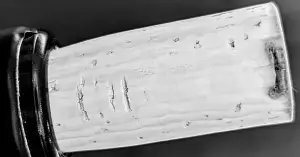
If you lead a vegan, vegetarian, or cruelty-free lifestyle, then you’re probably curious about vegan wines.
Winemakers can use animal byproducts during the winemaking process like casein (milk), albumin (egg), and isinglass (fish). If used, the wine isn’t vegan. Vegan wines use non-animal products like pea protein and clay, instead. Look for helpful certification logos on bottles to identify vegan wine brands.
Here’s what you need to know about finding vegan wines, along tips for finding vegan wines, and 11 vegan wine brands you can enjoy.
- What in the Winemaking Process Involves Animal Products?
- Why Don’t Wine Labels List Ingredients Like Eggs, Fish, and Milk?
- Common Questions About Vegan Wine
- Is Any White Wine Vegan?
- What Are the Vegan Wine Certification Bodies?
- What Brand of Wine Is Vegan?
- How Did You Come Up With This List of Vegan-Friendly Wines?
- Vegan Wine Brand # 1: All Wines – FitVine Wine
- Vegan Wine Brand # 2: Avaline
- Vegan Wine Brand # 3: Cupcake Lighthearted
- Vegan Wine Brand # 4: Cline Family Cellars
- Vegan Wine # 5: Frey Vineyards
- Vegan Wine # 6: Jam Jar Wines
- Vegan Wine Brand # 7: LYBL Live Your Best Life
- Vegan Wine Brand # 8: Shaw Organic
- Vegan Wine Brand # 9: Sunny with a Chance of Flowers Wines
- Vegan Wine Brand # 10: [yellow tail]
- Vegan Wine Brand #11: Bogle
- Final Thoughts – Which Wines Are Vegan? So Many!
- Thirsty for More?
What in the Winemaking Process Involves Animal Products?
After the grapes get crushed, pressed, and fermented into wine, the new wine has small particles floating around in it. If you’ve ever had a hazy wine, then you know what this looks like. Most wine lovers don’t want cloudy wine, so the winemaker needs to clarify, or fine the wine.
The animal-based additives used to fine wine can be non-vegan, including:
- casein
- egg whites
- isinglass
- gelatin
- kittens (just kidding – no kittens are used in winemaking unless it’s to boost morale at the winery)
Fining agents don’t stay in the wine permanently. They have charged particles that bind molecules together to form larger, heavier molecules that then drop to the bottom of the winemaking tank. The clean wine gets siphoned off and filtered before bottling. Even though the fining agents get left behind, the winemaker still used animal products to craft your wine. So, the wine technically isn’t vegan. This is also an important factor for people who might have food allergies.
Luckily, non-animal products can also fine wine. Products like clay (bentonite), pea protein (gaining in popularity), and even synthetic powder can be substituted for animal-based fining agents.

Check out this gallon of Cabernet Sauvignon rose wine I’m making. I used bentonite clay one week ago to help settle out the wine and reduce cloudiness. You can see the clay and particulates from the liquid compacted on the bottom of the glass jar on the right. The next step is to siphon off the clean wine and leave the clay behind. Whether I use clay, egg, milk, or pea powder, it’s the same process.
So… whether your wine is vegan or not vegan goes back the choices of the winemaker.
Why Don’t Wine Labels List Ingredients Like Eggs, Fish, and Milk?

As of right now in 2023, there are no labeling requirements or regulations for alcohol when it comes to the winemaking process, except for sulfite additions.
That may soon change.
Wine Business International posted this recent update to wine export labeling laws:
- From December 8, 2023, labels of wines sold in the EU will have to reveal nutritional and ingredient information directly, or via a QR code. Until now, wine producers with no interest in exporting to Europe have imagined themselves to be immune from this kind of legal requirement, but a court ruling now means that American consumers may soon see the same information on bottles from California on sale in the US.
Great news for vegan wine lovers and others with food allergies!
This could be a boon for wine enthusiasts who are label-conscious, regardless of whether you’re looking for vegan wine or not.
Common Questions About Vegan Wine
Before jumping into vegan wine brands, here are a few common questions you may have about vegan wines.
Jump down to the brands if you just want to check out wines – I don’t mind.
What’s the Difference Between Vegan Wine and Normal Wine?
Vegan wine avoids using animal products that normal wines use during the winemaking process. Some animal products used in wine include egg whites, or albumen, casein which is a milk protein, isinglass which is derived from fish bladders and is a form of collagen, and gelatin.
All of these products are used to fine wine, which helps remove cloudiness before its bottled.
Is Any White Wine Vegan?

Many white wines are vegan. Instead of using animal products for the fining process that helps to polish wines and make them crystal clear before bottling, the winemaker can use pea protein or even a synthetic fining agent called polyvinyl-polypyrrolidone (PVPP for short).
Fining white wines helps them appear brilliant and can remove bitter compounds. Look for vegan-certified white wines. Contact small production wineries directly to find out if they’re vegan.
Many small producers won’t be able to afford to go through the certification process.
Why Is White Wine Not Vegan?
Not all white wines are vegan. In fact, the color of the wine has nothing to do with whether a wine is or isn’t vegan. If the white wine you’re drinking used a product derived from animals during the winemaking process, then it’s not vegan.
These products may come from milk, fish, eggs, or even pigs. Red wines usually use egg whites, called albumen, and white wines often use milk protein, called casein.
Can Vegans Drink Pinot Grigio?
Vegans can drink Pinot Grigio if the wine carries a vegan certification logo on the bottle, or if you verify with the producer that the wine is vegan.
The winemaker may have used milk protein, called casein, to help fine the wine and polish it to clarity before bottling.
Whether your Pinot Grigio is vegan friendly or not has nothing to do with the grape (in this case Pinot Grigio), and only depends on the winemaking processes.
Why Is Prosecco Not Vegan?
Prosecco, the delicious, affordable Italian sparkling wine that we all love for Sunday mimosas, isn’t vegan if the producer used animal products in the winemaking process. The winemaker may use milk, fish products, egg whites, or gelatin. If so, your Prosecco is non-vegan.
Helpful Tip #1: Check out this external link to the Italian Vegan Certification page that has several vegan-certified Proseccos.
Helpful Tip #2: Here’s a great post on the difference between Prosecco and Champagne (no, Prosecco’s not just cheap Champagne).
Is Merlot a Vegan Wine?

Vegans can drink Merlot and red wines made from other grapes (not just Merlot) if the wine carries a vegan certification logo on the bottle, or if you verify with the producer that the wine is vegan. The winemaker may have used milk protein, called casein, or egg white, called albumen, to help fine the wine and polish it to clarity before bottling. Whether your Merlot wine is vegan friendly or not has nothing to do with the grape type (like Merlot), but depends on the winemaking processes at the winery.
Helpful Tip: Go check out this overview post of Merlot wine.
Do Vegan Wines Have Animal Products?
If your wine has a vegan certified logo on the bottle, then the winemaker didn’t use any animal products during the winemaking process and your wine is vegan.
However, certification can be expensive, especially for small boutique producers. It’s always worth reaching out to your favorite brands and asking them if their wines are vegan.
Just know that there’s no global law to guarantee vegan disclosure.
What Are the Vegan Wine Certification Bodies?
As you browse the wine aisle, you’ll probably come across several different vegan certification logos. Here are a few worth knowing:
Certified Vegan: Vegan.org

The Vegan.org trademark certifies that the products don’t contain animal products or by-products and that have not been tested on animals.
The European V-Label Union
According to their website, the European V-Label Union is the world’s most widely-recognized vegan and vegetarian certification body.

Check out this bottle of rose wine from Lagranja that I found at my local Trader Joe’s. What I like about the V-Label logo is that they’ve really made it pop out and easy to spot by using bright yellow.
What Brand of Wine Is Vegan?
Here’s a list of 11 wine brands that you should be able to find in your local market.
Helpful Tip: CAREFUL! Some wines in a brand’s portfolio may be vegan, and others may not be.
This is something you need to be aware of.
For example, the brand’s white wines may be vegan but the red wines may not be vegan depending on how the winemaker needed to craft the flavors or profile of a particular wine.
Also, if the winemaker changes for a brand (i.e., they hire someone new), then the winemaking process may change.
It’s always a good idea to check back with the website or winery occasionally to verify that the wines you want to buy are still vegan.
How Did You Come Up With This List of Vegan-Friendly Wines?
Vegan may be a lifestyle choice for some, but food allergies can have serious health consequences. I verified each and every website for the producers listed here. All information is current as of 2023. I’ve linked directly to their website pages that have nutritional information so you can double check yourself. If I couldn’t verify that a producer made vegan wine, I didn’t include it in the list below.
Helpful Reminder: Look for vegan certification logos on wines as you browse your favorite wine shops. You may discover your next favorite bottle!
Vegan Wine Brand # 1: All Wines – FitVine Wine
FitVine Wine’s red, white, and sparkling varietals are all vegan with no flavor additives and no compromise to complement all lifestyles.
Vegan Wine Brand # 2: Avaline
We knew the contents of everything that went onto and into our bodies — why not wine? We believe it’s important for our customers to know exactly what they’re sipping, which is why we maintain the highest standards for ingredient transparency. 100% VEGAN!
Vegan Wine Brand # 3: Cupcake Lighthearted

Cupcake is a well-known, well-distributed national wine brand across the US. Cupcake Lighthearted is their newest wine product line. According to their website: Nothing in our wines contains gluten and they are made in gluten free areas.
Vegan Wine Brand # 4: Cline Family Cellars

All of Cline’s wines are vegan. What I like about this particular brand is that it’s relatively easy to find and they’re committed to sustainability, too.
Vegan Wine # 5: Frey Vineyards
Frey Vineyards is a 3rd generation family owned and operated winery in Mendocino County, CA. Frey Organic Wines are Vegan and Gluten Free: No Animal or Gluten-Based Fining Agents Used.
Vegan Wine # 6: Jam Jar Wines

CAREFUL: Not all Jam Jar wines are vegan, but it’s easy to check any wine you may be interested in on their website and open the wine “spec sheets”. According to their website, the following Jam Jar wines are gluten free:
- Jam Jar Sweet Red Blend is vegan
- Jam Jar Sweet Shiraz is vegan
- Jam Jar Sweet Blush is vegan
- Jam Jar Sparkling Sweet Red is vegan
- Jam Jar Sweet White is NOT vegan
Jam Jar wines are the perfect example of how some wines under a label can be vegan, while others may not be. It’s always a good idea to double check with the producer.
Tasting Tip: Learn how to figure out if your wine is dry or sweet with this helpful post.
Vegan Wine Brand # 7: LYBL Live Your Best Life
California- Sustainably farmed, vegan friendly wine is mindful moderation at its finest. Note: LYBL is a label made under the Scheid Family wine brand. You won’t find LYBL wines listed as its own winery. Here’s a link to Total Wine with their vegan wine description
Vegan Wine Brand # 8: Shaw Organic

Trader Joe’s Shaw Organic wine brand is vegan. Check out the website: Shaw Organic – Bronco Trade
Great news if you’re a Trader Joe’s fan! Since 2012, Shaw Winery has been producing wines made with organic grapes.
We continue to strive to provide a collection of quality California wines with a focus on Cabernet Sauvignon, Chardonnay, Pinot Grigio, Pinot Noir, Rosé, and a Red Blend that are gluten-free and vegan friendly.
Vegan Wine Brand # 9: Sunny with a Chance of Flowers Wines

From the website: Sunny is made for mindful wine lovers – who, like us, believe less can be more. Zero sugar, fewer calories and less alcohol, yet still positively delicious! It’s everything you want in a wine and more –certified sustainable, vegan and gluten-free.
Vegan Wine Brand # 10: [yellow tail]

CAREFUL: Here’s another wine brand that offers “many” vegan friendly wines, but not all [yellow tail] wines are vegan. So be sure to visit their website and check out which Yellowtail wines are vegan!
Vegan Wine Brand #11: Bogle

CAREFUL: Not all Bogle wines are vegan every year, so it’s worth visiting their website to read the fact sheet. I love that they mark their wine clearly with the little logos to help consumers find and pick the wines that they want to drink! Here’s a helpful link to the Bogle website so you can check your wine.
Final Thoughts – Which Wines Are Vegan? So Many!

If you’re want to buy vegan wines, then you’ll need to become something of a sleuth.
Look for those vegan certification logos!
Many of the vegan wine brands listed in this post are sold widely across the US, but your local wine market may have different wines than what I find in my California wine shops.
You can find vegan red wines, vegan white wines, vegan rose wines, and even vegan sparkling wines with a little work.
If you love small, boutique wineries (I sure do!), then you’ll want to reach out to them directly and ask about their winemaking practices.
Independent certification bodies can be too expensive for small wineries, even though their wines are vegan-friendly. Just remember, there’s no legal requirement to honestly disclose whether a wine is vegan (or not), which is why vegan certifying-bodies can add a level of reassurance to some concerned consumers.
Thirsty for More?
Check out this post on gluten-free wines (and what makes some wines non-gluten free). Who knew there was so much healthy-lifestyle stuff to know about wine, right?!?
Here’s a post on unfined and unfiltered wines, which are two terms that you see on wine labels (a lot). But just what do they mean? Spoiler alert: Not what you think!



